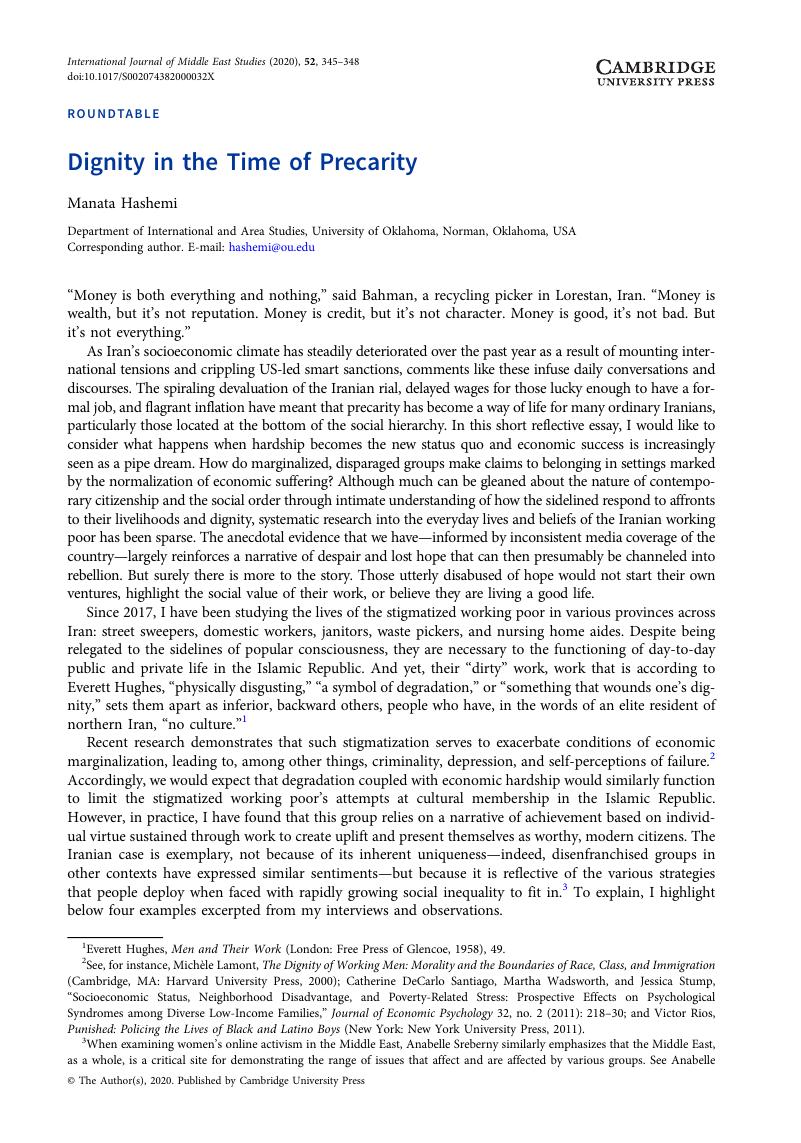No CrossRef data available.
Article contents
Dignity in the Time of Precarity
Published online by Cambridge University Press: 28 May 2020
Abstract

- Type
- Roundtable
- Information
- Copyright
- Copyright © The Author(s), 2020. Published by Cambridge University Press
References
1 Hughes, Everett, Men and Their Work (London: Free Press of Glencoe, 1958), 49Google Scholar.
2 See, for instance, Lamont, Michèle, The Dignity of Working Men: Morality and the Boundaries of Race, Class, and Immigration (Cambridge, MA: Harvard University Press, 2000)Google Scholar; Santiago, Catherine DeCarlo, Wadsworth, Martha, and Stump, Jessica, “Socioeconomic Status, Neighborhood Disadvantage, and Poverty-Related Stress: Prospective Effects on Psychological Syndromes among Diverse Low-Income Families,” Journal of Economic Psychology 32, no. 2 (2011): 218–30CrossRefGoogle Scholar; and Rios, Victor, Punished: Policing the Lives of Black and Latino Boys (New York: New York University Press, 2011)Google Scholar.
3 When examining women's online activism in the Middle East, Anabelle Sreberny similarly emphasizes that the Middle East, as a whole, is a critical site for demonstrating the range of issues that affect and are affected by various groups. See Sreberny, Anabelle, “Women's Digital Activism in a Changing Middle East,” International Journal of Middle East Studies 47, no. 2 (2015): 357– 61CrossRefGoogle Scholar.
4 For a discussion of how home care workers in the United States similarly find dignity in their “dirty” work, see Stacey, Clare, “Finding Dignity in Dirty Work: The Constraints and Rewards of Low-Wage Home Care Labour,” Sociology of Health and Illness 27, no. 6 (2005): 831– 54CrossRefGoogle ScholarPubMed.
5 Lamont, Working Men.
6 Sennett, Richard and Cobb, Jonathan, The Hidden Injuries of Class (New York: Knopf, 1972)Google Scholar.
7 See also the discussion in Manata Hashemi, “Tarnished Work: Dignity and Labour in Iran,” British Journal of Middle Eastern Studies (December 2018), doi:10.1080/13530194.2018.1552116.
8 For a discussion of how talk of public service enables garbage workers to affirm masculine identities in an entirely different context (the United Kingdom), see McMurray, Robert, Hamilton, Peter, and Redman, Tom, “‘Lower than a Snake's Belly’: Discursive Constructions of Dignity and Heroism in Low-Status Garbage Work,” Journal of Business Ethics 156, no. 4 (2019): 889–901Google Scholar. Janitors in the United States have similarly equated their work with that of doctors. See, for instance, Gold, Ray, “Janitors versus Tenants: A Status-Income Dilemma,” American Journal of Sociology 57, no. 5 (1952): 486– 93CrossRefGoogle Scholar.
9 Millar, Kathleen, “The Precarious Present: Wageless Labor and Disrupted Life in Rio de Janeiro, Brazil,” Cultural Anthropology 29, no. 1 (2014): 32– 53CrossRefGoogle Scholar.
10 Ulrich Beck as cited by Denning, Michael in “Wageless Life,” New Left Review 66 (2010): 85Google Scholar.
11 Payne, Yasser, “A Gangster and a Gentleman: How Street Life–Oriented U.S.–Born African Men Negotiate Issues of Survival in Relation to Their Masculinity,” Men and Masculinity 8, no. 3 (2006): 288– 97CrossRefGoogle Scholar.
12 Michael Denning, “Wageless Life.”
13 See also Hashemi, “Tarnished Work.”
14 Mittermaier, Amira, Giving to God: Islamic Charity in Revolutionary Times (Oakland, CA: University of California Press, 2019), 21CrossRefGoogle Scholar.


